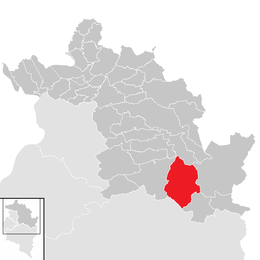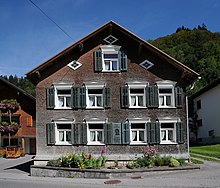Schoppernau
Schoppernau | |
|---|---|
 | |
 Location in the district | |
| Coordinates: 47°18′48″N 10°01′03″E / 47.31333°N 10.01750°E | |
| Country | Austria |
| State | Vorarlberg |
| District | Bregenz |
| Government | |
| • Mayor | Walter Beer |
| Area | |
• Total | 47.64 km2 (18.39 sq mi) |
| Elevation | 852 m (2,795 ft) |
| Population (2018-01-01)[2] | |
• Total | 950 |
| • Density | 20/km2 (52/sq mi) |
| Time zone | UTC+1 (CET) |
| • Summer (DST) | UTC+2 (CEST) |
| Postal code | 6886 |
| Area code | 05515 |
| Vehicle registration | B |
| Website | www |
Schoppernau is a town in the Bregenzerwald Region (Bregenz district) of the Austrian state of Vorarlberg. Schoppernau has an area of 47.64 km2.
Population
| Year | Pop. | ±% |
|---|---|---|
| 1869 | 486 | — |
| 1880 | 456 | −6.2% |
| 1890 | 445 | −2.4% |
| 1900 | 504 | +13.3% |
| 1910 | 601 | +19.2% |
| 1923 | 541 | −10.0% |
| 1934 | 535 | −1.1% |
| 1939 | 531 | −0.7% |
| 1951 | 712 | +34.1% |
| 1961 | 662 | −7.0% |
| 1971 | 785 | +18.6% |
| 1981 | 885 | +12.7% |
| 1991 | 897 | +1.4% |
| 2001 | 905 | +0.9% |
| 2011 | 923 | +2.0% |
History
Until the 10th century, Schoppernau seems to have been pristine forest. Schoppernau and Au were the last villages to be settled in the Bregenzerwald. Early on, the land in and around Schoppernau was probably used primarily as pastureland for sheep. The surrounding terrain was probably used as pastureland for sheep, as the name ("Schappernouw" = Schafau = sheep meadow or mead) indicates. The neighboring village of Au showed similar developments.
Coat of arms
The Schoppernau coat of arms has been in use since 12 March 1930. It is red with a bronze frame, showing a silver mountain summit in the background. In the middle there is a green uprooted spruce, with two silver cow bells to the left and right.
Culture
Schoppernau is part of the Bregenzerwald Umgang (literally "Bregenzerwald Walking Tour"). This walking tour offers insights into the architecture and community planning of 12 traditional villages in the Bregenzerwald. While walking over various landscapes, visiting public buildings, homes and everyday objects, walkers gain a comprehensive overview of typical Bregenzerwald architectural styles as they developed throughout the ages. The nine buildings chosen for the walking tour in Schoppernau include the Alpine Cheese Dairy (Bergkäserei), several farmhouses, an old sawmill, the fire department, and the primary school.
The 19th century half-timbered farmhouses in Schoppernau present many typical features of the unique Bregenzerwald farm architecture, particularly their joined timber beams sealed with moss.

Exhibits in the Franz Michael Felder Museum present the life, times and work of Franz Michael Felder, author, farmer and social reformer, one of the most prominent historical personalities of the Bregenzerwald.[3]
The parish church Schoppernau was built in 1710 by the architect Johann Brenner von Gräsalp (1664-1749). In 1838, an organ was installed. In 1917, all four church bells were taken down and their metal was used in the war effort World War I.

Climate
| Climate data for Schoppernau (1981–2010) | |||||||||||||
|---|---|---|---|---|---|---|---|---|---|---|---|---|---|
| Month | Jan | Feb | Mar | Apr | May | Jun | Jul | Aug | Sep | Oct | Nov | Dec | Year |
| Record high °C (°F) | 16.0 (60.8) |
17.5 (63.5) |
21.7 (71.1) |
24.5 (76.1) |
29.9 (85.8) |
32.6 (90.7) |
34.0 (93.2) |
33.4 (92.1) |
29.3 (84.7) |
25.3 (77.5) |
23.1 (73.6) |
19.2 (66.6) |
34.0 (93.2) |
| Mean daily maximum °C (°F) | 0.5 (32.9) |
3.1 (37.6) |
7.6 (45.7) |
12.0 (53.6) |
17.4 (63.3) |
20.0 (68.0) |
22.3 (72.1) |
21.6 (70.9) |
17.8 (64.0) |
13.5 (56.3) |
5.8 (42.4) |
1.2 (34.2) |
11.9 (53.4) |
| Daily mean °C (°F) | −4.1 (24.6) |
−2.9 (26.8) |
1.0 (33.8) |
5.1 (41.2) |
10.6 (51.1) |
13.8 (56.8) |
15.8 (60.4) |
14.9 (58.8) |
11.2 (52.2) |
7.1 (44.8) |
0.9 (33.6) |
−2.8 (27.0) |
5.9 (42.6) |
| Mean daily minimum °C (°F) | −7.7 (18.1) |
−7.0 (19.4) |
−3.2 (26.2) |
0.5 (32.9) |
4.9 (40.8) |
8.2 (46.8) |
10.3 (50.5) |
10.0 (50.0) |
7.0 (44.6) |
3.2 (37.8) |
−2.4 (27.7) |
−6.0 (21.2) |
1.5 (34.7) |
| Record low °C (°F) | −28.0 (−18.4) |
−23.8 (−10.8) |
−23.3 (−9.9) |
−10.6 (12.9) |
−4.9 (23.2) |
−1.0 (30.2) |
1.5 (34.7) |
1.6 (34.9) |
−2.2 (28.0) |
−11.5 (11.3) |
−19.8 (−3.6) |
−21.0 (−5.8) |
−28.0 (−18.4) |
| Average precipitation mm (inches) | 135 (5.3) |
126 (5.0) |
161 (6.3) |
134 (5.3) |
172 (6.8) |
225 (8.9) |
265 (10.4) |
251 (9.9) |
175 (6.9) |
126 (5.0) |
149 (5.9) |
153 (6.0) |
2,073 (81.6) |
| Average snowfall cm (inches) | 93 (37) |
88 (35) |
84 (33) |
39 (15) |
5 (2.0) |
1 (0.4) |
0 (0) |
0 (0) |
0 (0) |
6 (2.4) |
54 (21) |
90 (35) |
459 (181) |
| Average relative humidity (%) (at 14:00) | 82.3 | 69.3 | 58.9 | 52.1 | 53.7 | 56.6 | 57.9 | 59.1 | 60.6 | 64.0 | 79.4 | 85.6 | 65.0 |
| Source: Central Institute for Meteorology and Geodynamics[4][5][6][7][8] | |||||||||||||
| Climate data for Schoppernau (1971–2000) | |||||||||||||
|---|---|---|---|---|---|---|---|---|---|---|---|---|---|
| Month | Jan | Feb | Mar | Apr | May | Jun | Jul | Aug | Sep | Oct | Nov | Dec | Year |
| Record high °C (°F) | 16.0 (60.8) |
17.5 (63.5) |
21.7 (71.1) |
24.0 (75.2) |
28.0 (82.4) |
31.6 (88.9) |
34.0 (93.2) |
32.3 (90.1) |
29.6 (85.3) |
25.3 (77.5) |
23.1 (73.6) |
19.2 (66.6) |
34.0 (93.2) |
| Mean daily maximum °C (°F) | 0.8 (33.4) |
3.3 (37.9) |
7.4 (45.3) |
11.0 (51.8) |
16.7 (62.1) |
19.0 (66.2) |
21.4 (70.5) |
21.1 (70.0) |
17.8 (64.0) |
13.1 (55.6) |
5.4 (41.7) |
1.4 (34.5) |
11.5 (52.7) |
| Daily mean °C (°F) | −3.8 (25.2) |
−2.6 (27.3) |
1.0 (33.8) |
4.4 (39.9) |
10.1 (50.2) |
12.9 (55.2) |
15.2 (59.4) |
14.6 (58.3) |
11.1 (52.0) |
6.7 (44.1) |
0.6 (33.1) |
−2.6 (27.3) |
5.6 (42.1) |
| Mean daily minimum °C (°F) | −7.3 (18.9) |
−6.6 (20.1) |
−3.2 (26.2) |
−0.1 (31.8) |
4.4 (39.9) |
7.5 (45.5) |
9.8 (49.6) |
9.7 (49.5) |
6.7 (44.1) |
2.7 (36.9) |
−2.8 (27.0) |
−5.9 (21.4) |
1.2 (34.2) |
| Record low °C (°F) | −28.0 (−18.4) |
−23.8 (−10.8) |
−24.2 (−11.6) |
−12.0 (10.4) |
−7.0 (19.4) |
−1.0 (30.2) |
1.5 (34.7) |
0.2 (32.4) |
−2.4 (27.7) |
−9.1 (15.6) |
−19.8 (−3.6) |
−24.4 (−11.9) |
−28.0 (−18.4) |
| Average precipitation mm (inches) | 129.8 (5.11) |
114.9 (4.52) |
137.5 (5.41) |
133.6 (5.26) |
148.2 (5.83) |
223.2 (8.79) |
247.4 (9.74) |
211.8 (8.34) |
152.3 (6.00) |
120.7 (4.75) |
145.6 (5.73) |
143.1 (5.63) |
1,908.1 (75.12) |
| Average snowfall cm (inches) | 96.7 (38.1) |
83.7 (33.0) |
90.5 (35.6) |
42.8 (16.9) |
5.9 (2.3) |
0.5 (0.2) |
0.0 (0.0) |
0.0 (0.0) |
0.1 (0.0) |
5.9 (2.3) |
54.9 (21.6) |
101.2 (39.8) |
482.2 (189.8) |
| Average precipitation days (≥ 1.0 mm) | 12.3 | 11.0 | 13.4 | 13.5 | 14.5 | 16.9 | 16.2 | 15.8 | 12.4 | 11.0 | 12.2 | 12.9 | 162.1 |
| Average relative humidity (%) (at 14:00) | 80.4 | 69.6 | 58.8 | 54.4 | 54.6 | 57.3 | 58.0 | 58.4 | 59.4 | 64.0 | 78.2 | 83.2 | 64.7 |
| Source: Central Institute for Meteorology and Geodynamics[9] | |||||||||||||
Trivia
In Vorarlberg, Austria, Schoppernau is known for the song "Vo Mello bis ge Schoppornou" (Alemannic: From Mellau to Schoppernau), by the Bregenzerwälder band Holstuonarmusigbigbandclub.
Personalities
- Franz Michael Felder (1839–1869)
- Walter Strolz (born 1927)
See also
External links
- Official website
- Timber framing
- http://www.felderverein.at/
- https://vlb.vorarlberg.at/was-haben-wir/felder-archiv/ueber-uns.html
References
- ^ "Dauersiedlungsraum der Gemeinden Politischen Bezirke und Bundesländer - Gebietsstand 1.1.2018". Statistics Austria. Retrieved 10 March 2019.
- ^ "Einwohnerzahl 1.1.2018 nach Gemeinden mit Status, Gebietsstand 1.1.2018". Statistics Austria. Retrieved 9 March 2019.
- ^ "Franz Michael Feldermuseum Schoppernau". www.au-schoppernau.at (in German). Retrieved 2021-06-02.
- ^ "Klimamittel 1981–2010: Lufttemperatur" (in German). Central Institute for Meteorology and Geodynamics. Archived from the original on 21 October 2019. Retrieved 19 November 2019.
- ^ "Klimamittel 1981–2010: Niederschlag" (in German). Central Institute for Meteorology and Geodynamics. Archived from the original on 29 December 2014. Retrieved 19 November 2019.
- ^ "Klimamittel 1981–2010: Schnee" (in German). Central Institute for Meteorology and Geodynamics. Archived from the original on 29 December 2014. Retrieved 19 November 2019.
- ^ "Klimamittel 1981–2010: Luftfeuchtigkeit" (in German). Central Institute for Meteorology and Geodynamics. Archived from the original on 21 October 2019. Retrieved 19 November 2019.
- ^ "Klimamittel 1981–2010: Strahlung" (in German). Central Institute for Meteorology and Geodynamics. Archived from the original on 29 December 2014. Retrieved 19 November 2019.
- ^ "Klimadaten von Österreich 1971–2000 – Vorarlberg-Schoppernau" (in German). Central Institute for Meteorology and Geodynamics. Archived from the original on 12 October 2019. Retrieved 7 November 2019.


